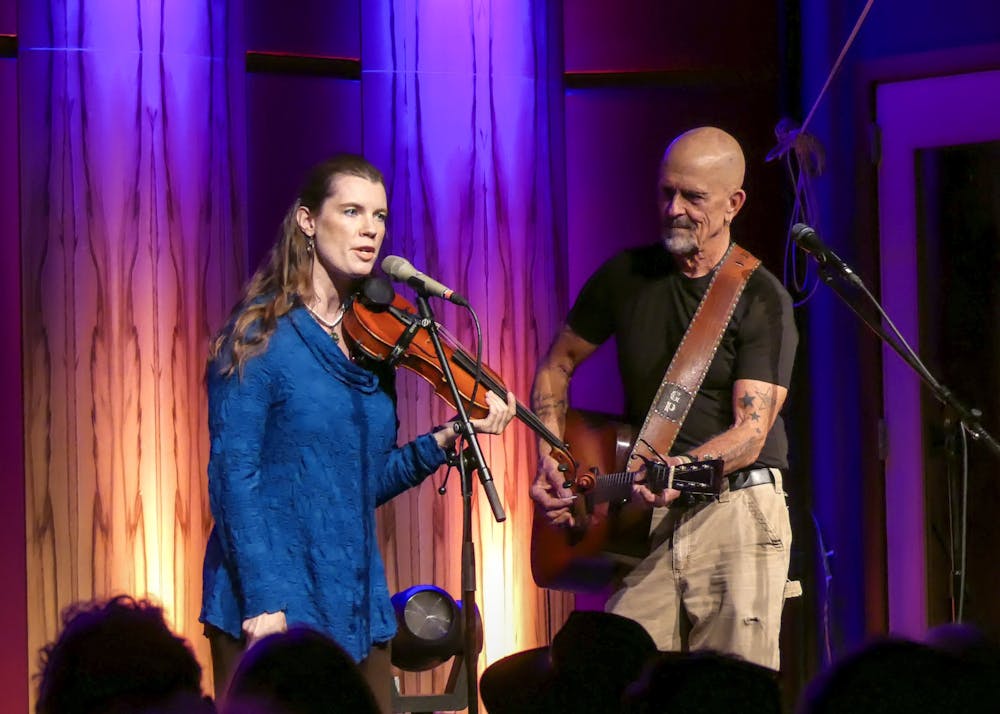While touring the U.S., folk musician Grant Peeples pulled inspiration from the interstates that endlessly stretched in front of him. When he returned to Florida, the roadkill and landfills he often passed encouraged him to pull from what he observed physically and politically.
Sixty-eight-year-old Peeples is often accused of writing protest songs, but the feedback doesn’t discourage him. He doesn’t hesitate to tell people exactly what he’s passionate about, he said, even by calling Florida’s governor a “sleaze” in the middle of a set or promoting his “fascist-fighting” Nicaraguan coffee.
At Heartwood Soundstage Aug. 2, Peeples performed heartfelt original songs alongside Americana band Passerine’s Sara Stovall. The blend of the velvet-smooth tear of Stovall’s violin and Peeples’ sharp lyricism stirred a standing ovation from the crowd.
When Peeples played his newest song, written about Alligator Alcatraz, he made it known he would rather be scorned than associated with the destruction of the environment and its people, he said.
The Tallahassee native didn’t think he’d become a professional musician until he was 50 years old. After living on a small island in Nicaragua for 11 years, he returned to the U.S. in 2006 with a new understanding of American consumerism. His culturally relevant songwriting became a reaction to the driving factors of American life.
To Peeples, songwriting’s never-ending process allows songs to be changed decades down the line. Always people-oriented, he believes musicians never finish a song — they abandon it.
“I try to write the perfect song,” Peeples said. “I don’t try to sing it perfectly because I’m not a great singer and a great guitar player, but I want the structure to be there. I want the words to be right.”
Famed Abraham Lincoln impersonator Lew Welge met Peeples 15 years ago at Beluthahatchee, a tract of land in Fruit Cove, the same place where folk legend Woody Guthrie wrote 80 of his songs. Welge followed Peeples to his car after a concert and asked if he could hear some of his music.
Welge attends Peeples’ shows because of the musician’s poetic storytelling. He believes Peeples’ political allusions are warranted, considering the state of Florida’s government.
“He gives voice,” Welge said. “[Resistance is] not a fight we’re bound to lose. It’s a long-standing, ages-old struggle against injustice and for social justice. Music is revolutionary.”

Kat Dow, a 46-year-old Sarasota resident, was raised on folk music. Folk tradition passes down songs and stories that can’t be taken away, they said. It’s hard to define American folk music because being American has become closely related to stealing ideas, cultures and land, they added.
Yet the same goes for defining a song as hip hop, indie rock or country. Genres are like gender: It’s what you make of it, they said.
Dow met Peeples at a house concert in Sarasota a few years ago, where they encountered Peeples’ intense performing style and dedication to his craft. It’s clear he carves out time to write every waking minute, they said.
“I’ve got 1,000 voice memos in my phone,” Dow said. “They’re called whatever road I was driving on when something popped into my head. You know what I don’t do? Finish it. And [Peeples has] the commitment to finish it, and that’s admirable.”
Peeples struggled with addiction for years. After many years of recovery, he found writing to be the one thing that truly pushed him forward.
“Sometimes it’s the only oxygen I can get,” Peeples said. “It sustains me. I figure out what I think about things by writing about them.”
Contact Autumn Johnstone at ajohnstone@alligator.org. Follow them on X @AutumnJ922.
Autumn Johnstone is a freshman journalism/art student and a music reporter for The Avenue. When they're not writing, you can find them enjoying a nice cup of coffee at a nearby café or thrifting for vinyls.






